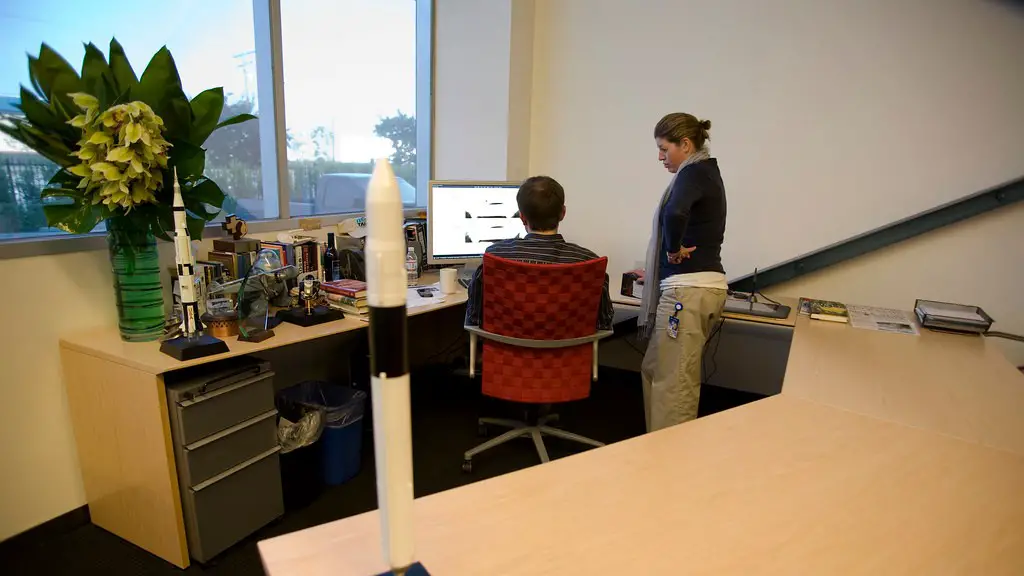Mark Zuckerberg, the founder and CEO of Facebook, has been an integral part of the online social networking scene since 2004. His story – both in real life and on the big screen – has captivated millions of people around the world. The Social Network movie, which was released in 2010 and based on Zuckerberg’s vision and journey, is still one of the most talked-about movies of its time. So what exactly does Mark Zuckerberg think of the movie?
In the years following its release, Zuckerberg has shared a few views on the movie and its portrayal of him. Speaking to 60 Minutes in 2013, he said, “The movie had one interesting thing, which was that [I was] this kind of socially-awkward person—which I think I am, for sure—but also kind of an awkward person who builds sort of machines and technology to get people closer together.” In other words, he appreciates certain aspects of the movie, but does not consider it an accurate representation of his life or his views.
It is important to remember that although Zuckerberg is one of the movie’s protagonist, he was not the film’s executive producer and thus had no control over its direction. Many of the accusations and assumptions made in it are quite far from the truth, and it appears that Zuckerberg is well aware of this. In a 2018 interview with The Harvard Gazette, he said, “On some level this stuff [in the movies] looks real, but it’s really fictional. There are messinesses in the way they [the filmmakers] portrayed things that I wish weren’t there.” He was not the only one who was skeptical of the movie’s accuracy – a number of other experts and journalists have raised doubts about its credibility at various times.
It is a matter of debate whether or not The Social Network movie was an accurate representation of Mark Zuckerberg and the events leading up to the founding of Facebook. While there are some elements of truth in the movie, much of what it portrays is distorted and fabricated. Zuckerberg himself praised certain aspects of the movie and expressed his dissatisfaction with some of its depictions. At the end of the day, however, the movie remains a powerful and engaging piece of art that has gained immense popularity in the decade since its release.
The Impact of Facebook on Society
In the past decade, Facebook has become an integral part of our lives. It is not just an online social networking platform but has also transformed the way we communicate, interact, and do business. It has become an essential tool for work and personal use, and its impact on society is undeniable. Social media networks like Facebook have made it easier than ever to stay connected to people around the world, share information, and engage in meaningful conversations.
Today, Facebook is used by billions of people around the world and has greatly changed the way we think about and interact with each other. Through Facebook, people can easily spread positive and inspiring messages, form connections with people of different backgrounds, and find support and guidance. It has also enabled small businesses and entrepreneurs to reach people from all over the world, giving them an opportunity to showcase their products and services and connect with a wider audience.
Facebook has also helped to create strong communities, both online and offline, that help to promote creative collaborations and join people together in notable causes. There is no question that Facebook has made a positive and widespread impact on society. As Mark Zuckerberg put it, “When people are empowered to express themselves and are connected, we can achieve incredible things.”
Facebook’s Complicated Relationship with Privacy
Facebook’s relationship with privacy and data is much to discuss. Right from its inception, the platform was built with a commitment to protecting user data and giving people control over their information. However, over the years, Facebook has been accused of violating users’ privacy rights, collecting and storing personal data without getting consent, and other misdeeds. As a result, it has been embroiled in a series of controversies, resulting in data scandals, fine, and criticism.
Facebook has also come under fire for the ways in which it has tried to address the issue of privacy. In recent years, it has introduced a number of tools and policies in an effort to make user data more secure and to give people more control over their information. Unfortunately, many people still don’t feel like their data is adequately protected and many are still skeptical of how much data Facebook actually collects.
The company acknowledges that it has made mistakes in the past, but it has also shown a commitment to improving its practices and creating a more secure and transparent platform for users. In the recent years, Facebook has made progress in the area of user privacy and is taking steps to ensure that user data is secure and not misused.
Facebook’s Impact on Mental Health
Although Facebook has been credited for helping to connect people and enriching our lives, it has also been linked to mental health issues, such as anxiety and depression. Research suggests that excessive Facebook usage can have a negative effect on our mental health. Comparing oneself to others to unrealistic “perfect” images, receiving validation from likes, feeling the pressure to constantly post updates, can all have a deteriorating effect on one’s mental wellbeing.
In response to this, Facebook has taken a number of steps to help reduce the impact of its platform on users’ mental health. It has introduced measures such as the Reality Check tool, which allows users to check the accuracy of news articles they see on the platform. Facebook has also launched initiatives such as the Digital Wellbeing initiative, which is aimed at making the social media platform a healthier and more positive place. In addition, it has partnered with organizations such as the National Suicide Prevention Lifeline to provide people with mental health support.
While it is undeniable that Facebook has a negative impact on some people’s mental health, it is important to remember that the social media giant is taking proactive measures to try and address this issue. From providing users with resources to introducing mental health initiatives, Facebook is trying to make the platform a more positive and healthy place for everyone.
The Future of Facebook
For over a decade now, Facebook has played a major role in our lives. It has come a long way since its humble beginnings, and it promises to continue to grow and evolve in the years to come. Over the past few years, Facebook has developed artificial intelligence systems, overhauled its user experience, introduced new features and initiatives, and worked hard to make its platform more secure and resilient. This shows that Zuckerberg and his team are committed to keeping Facebook on the cutting edge of technology and innovation.
In the future, we can expect to see Facebook pushing the boundaries of technology and enabling people to connect and share information in new and exciting ways. It is clear that the platform is here to stay and that it will continue to be an integral part of our lives. Only time will tell what the future of Facebook will look like.


